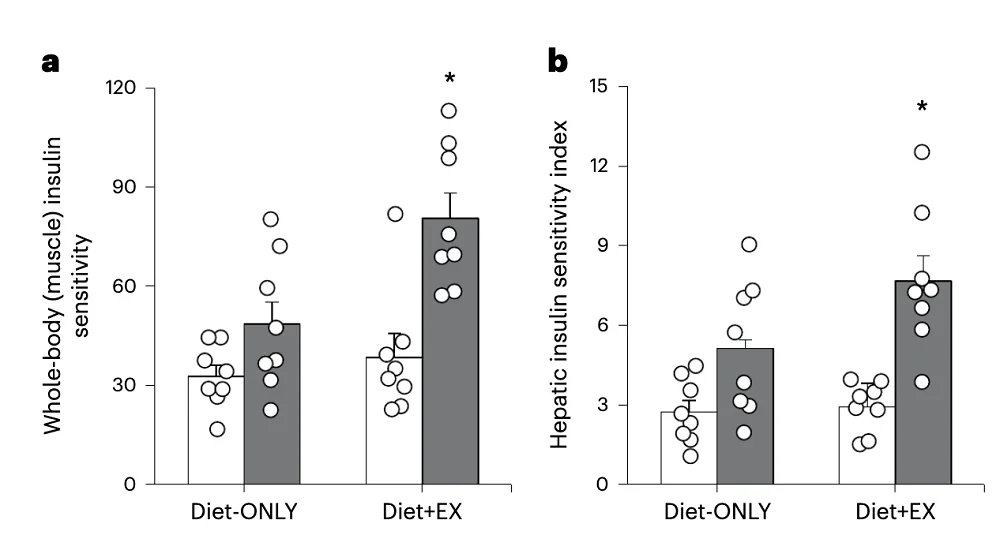Scientists publishing in Nature Metabolism have determined that in obese people, healthy diet and exercise bring stronger metabolic benefits than diet alone [1].
Better together
There are two major interventions at hand for weight loss without resorting to medications: diet and exercise. However, recent research suggests that they are not interchangeable. Forgoing either one can result in a partial effect and even create new problems, such as lean mass loss for people who diet without pumping iron or other resistance training [2]. On the other hand, exercise without a healthy diet might not help with metabolic problems [3]. This new interventional study largely confirms this emerging consensus, adding some important details.
The researchers recruited obese prediabetic patients for a five-month-long program tuned for inducing mild weight loss (10% of body mass). All participants received a “plant-forward” diet dominated by vegetables, fruit, whole grains, seeds, and legumes that provided 70% of the calories from carbohydrates, 15% from protein, and 15% from fats.
Half of the participants also underwent an exercise program of six one-hour sessions per week. The calorie intake at the beginning of the study covered 75% of the recommended number of calories for both groups (the exercising group received more), and then it was fine-tuned to achieve a weight loss of 10%. Apparently, the fine-tuning succeeded, since the average weight loss in both groups was nearly identical.
Interestingly, and somewhat counterintuitively, the two groups did not significantly differ in lean mass dynamics, as both experienced slight loss. The researchers hold that this might be due to the combination of the relatively mild pace and amount of weight loss and the high quality of the diet.
Exercise adds insulin sensitivity
The study’s main endpoint was insulin sensitivity, a major marker of metabolic health. Insulin is the hormone that signals to cells of several types, such as muscle cells, to take up glucose from bloodstream and store it. Insulin sensitivity is impaired in metabolic disorders such as diabetes.
Both groups experienced a significant increase in whole-body insulin sensitivity following the treatment, but in the exercising group, insulin sensitivity was twice as high as in the diet-only group. The researchers admit that measuring insulin sensitivity in exercising people is tricky, since every bout of exercise is known to transiently increase it. However, they suggest that the study’s design made it possible to capture both the transient and long-term effects of exercise.

Several other metabolic markers, such as triglycerides, HDL cholesterol, and fasting blood glucose, improved as well but roughly equally in both groups, probably due to the healthy diet and weight loss. The gut microbiome also uniformly changed in both groups, but only during the first month, despite the fact that weight loss continued throughout the study. Presumably, diet quality was the only factor responsible for that.
Exercise upregulates mitochondrial and autophagy pathways
The reseachers then dug deeper into the changes caused specifically by exercise. While an analysis of the skeletal muscle transcriptome showed virtually no changes in the diet group, in the exercising group, dozens of genes were either upregulated or downregulated by the treatment. The two most prominent pathways to show positive changes were mitochondrial energy metabolism and angiogenesis (creation of new blood vessels), which is consistent with previous research.
Unlike the muscle transcriptome, proteomic analysis of blood plasma showed changes for both groups, but they were far from identical. For instance, autophagy-related pathways were highly upregulated in the exercising group but downregulated in the diet-only group.
“Obesity makes the body resistant to insulin’s ability to decrease glucose production by the liver and increase glucose uptake by skeletal muscle tissue, leading to an increase in blood glucose concentrations,” said senior investigator Samuel Klein, MD, director of the Center for Human Nutrition in Washington University School of Medicine in St. Louis. “Insulin resistance is a major factor that causes Type 2 diabetes, nonalcoholic fatty liver disease and abnormal blood lipids in people with obesity. We’ve shown that combining exercise with weight loss causes a marked improvement in whole-body insulin sensitivity, thereby lowering the risk of developing diabetes and treating obesity-related metabolic diseases to a much greater degree than is possible with weight loss alone.”
This study has several limitations, starting with the small sample size. The researchers also admit that insufficient decoupling of the acute and long-term effects of exercise on insulin sensitivity is still a concern. Nevertheless, these results convincingly support the idea that a combination of exercise and a healthy diet provide the maximum impact on metabolic health.
Literature
[1] Beals, J.W., Kayser, B.D., Smith, G.I. et al. (2023) Dietary weight loss-induced improvements in metabolic function are enhanced by exercise in people with obesity and prediabetes. Nat Metab.
[2] Roth, C., Schoenfeld, B. J., & Behringer, M. (2022). Lean mass sparing in resistance-trained athletes during caloric restriction: the role of resistance training volume. European Journal of Applied Physiology, 122(5), 1129-1151.
[3] Guo, J., Zhang, X., Wang, L., Guo, Y., & Xie, M. (2013). Prevalence of metabolic syndrome and its components among Chinese professional athletes of strength sports with different body weight categories. PLoS One, 8(11), e79758.





